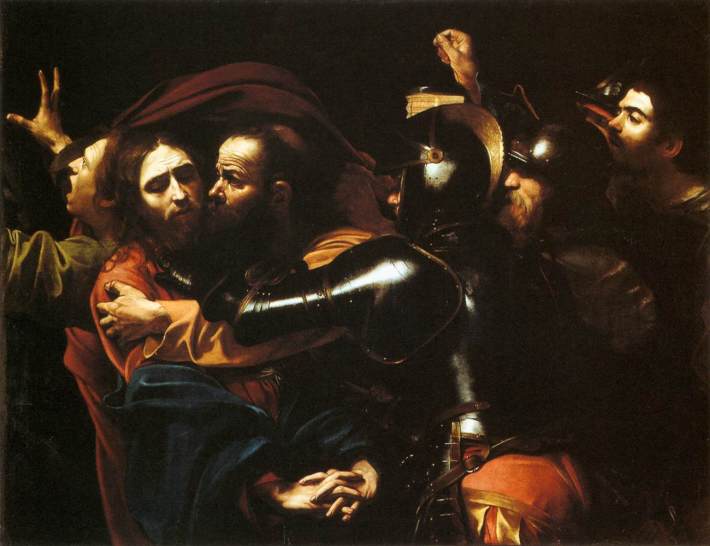Today we read the first of the four passion accounts. Perhaps it’s because I’ve been reading the bible each day, but finally coming to this moment – the climactic one of the whole book – today I found extraordinarily compelling, even moving. And the figure of Judas I found especially compelling and moving.
Judas as a character has always bothered me. To some extent, he always seemed like sort of a pawn in a game way above his paygrade (if I might mix some metaphors). I mean, somebody had to betray Jesus. This is a necessary part of the story, and the way Matthew tells it, Judas isn’t really a rascal or a scoundrel, just a guy who makes a mistake and is maybe taken advantage of by some powerful folks.
 The Capture of Christ, Caravaggio, 1598
The Capture of Christ, Caravaggio, 1598
Indeed, the story we’re given in Matthew renders Judas with some sympathy. Jesus is letting himself be anointed with expensive oils and by a strange woman (this would appear to break a sexual taboo at least, and should raise some fairly reasonable questions – as it does here for the disciples – about Jesus’ previous teachings with regard to the poor), so Judas thinks maybe the temple priests (sort of like today’s bishops) should have a talk with Jesus, straighten him out a bit. Then it all spirals out of control and Judas realizes the priests wanted to do more than just talk.
Judas repents (this is what we’re supposed to do when we wrong God and each other, right?) and rejects the spoils of his betrayal. And lest we believe this was all Judas’ fault, the gospel reminds us that Jesus’s death is not his or Pilate’s (recall the Roman governor’s handwashing) or anyone else’s fault. It is our own. None of us is any more or less guilty of this death than Judas. Judas plays a role more directly in the historical event than we could, but Jesus didn’t die because of Judas Iscariot. Jesus died because of us. We occasion Christ’s sacrifice, whether we betray him directly or not.
I guess where Judas goes most wrong is that, once he’s repented and the priests rebuff him, he despairs and kills himself. He has done too bad a thing, he concludes, he has committed too grievous and terrible a crime to be forgiven. But of course, he can be. God’s love is greater than even the greatest sin. Perhaps Judas’ final mistake was of the same sort as his first: he didn’t fully reckon the love of Christ, he didn’t have enough faith in who and what this man was. He believed his capacity to betray Christ could exceed Christ’s capacity to forgive. So he killed himself for lack of faith, not for depth of sin.
We are all in Judas’ place. Christ goes to the cross for us. Our sins are as deep and grievous as Judas’. But God’s love is deeper still, and this is what the sign of Christ’s betrayal and death remind us.
See you in the gospel of Mark,
Matt

Matt -thanks for your comments on the readings. They are helpful to me, especially as I tend to get bogged down in the Old Testament. So many names — and confusing words !!
I want to echo Cyndy’s appreciations and add thanks to Jane for bringing the blog to my attention! As I keep up with the readings here in NYC, it’s terrific to feel connected in this endeavor with all of you. What a poignant image! A reference on the web indicates that Caravaggio painted himself into the scene – the man on the right, holding the lamp – and by extension all of us through the centuries, who’ve seen his painting. This image reminds me of a similar one we saw Saturday on our MFA tour. I just discovered that it is visible online at the MFA’s website: http://www.mfa.org/collections/object/the-taking-of-christ-34311